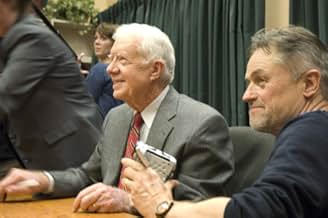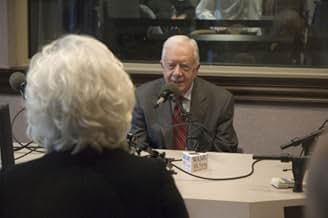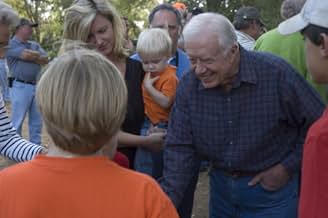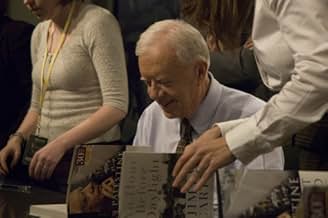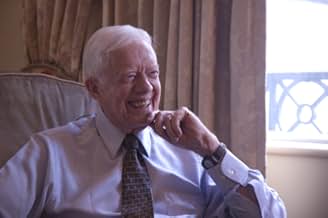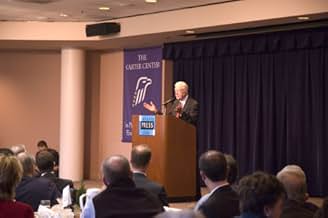Aggiungi una trama nella tua linguaA chronicle of the former president's tour recent for his book "Palestine: Peace Not Apartheid."A chronicle of the former president's tour recent for his book "Palestine: Peace Not Apartheid."A chronicle of the former president's tour recent for his book "Palestine: Peace Not Apartheid."
- Premi
- 3 vittorie e 3 candidature totali
Lillian Carter
- Self
- (filmato d'archivio)
Recensioni in evidenza
I've long felt that Mr Carter is most likely the greatest man to ever occupy the White House. This film reinforced that. I've long been a staunch advocate of Israel and the right of Israel to protect itself. This movie (and the book around which it revolves) did nothing to change that. What did change, what I found really embarrassing was the behavior of the advocates of Israel shown in this film. I say this as someone who lost a close friendship with an Arab over an on-going argument regarding Israel when I quoted Golda Meir: There will only be peace when they love their children more than they hate us. But it goes both ways.
President Carter reminds us that, in order to seek peace, we must take risks and have open minds, open arms and open hearts. The "pro-Israeli" protesters and interviewees in this film seem to care nothing about ending the nonsense that has touched every single Israeli and Palestinian Arab family over these past 60 years. If seeing and listening to President Carter hadn't been such a thrill, I might have left this film with great disdain for these opponents of peace. Instead, I feel as though I was allowed a two hour glimpse at the greatness of a man who will never be appreciated appropriately in history books. He's an incredible man. What prevents me from giving this a ten is that the editing and direction of this film were far from incredible.
President Carter reminds us that, in order to seek peace, we must take risks and have open minds, open arms and open hearts. The "pro-Israeli" protesters and interviewees in this film seem to care nothing about ending the nonsense that has touched every single Israeli and Palestinian Arab family over these past 60 years. If seeing and listening to President Carter hadn't been such a thrill, I might have left this film with great disdain for these opponents of peace. Instead, I feel as though I was allowed a two hour glimpse at the greatness of a man who will never be appreciated appropriately in history books. He's an incredible man. What prevents me from giving this a ten is that the editing and direction of this film were far from incredible.
Jonathan Demme's documentary follows Jimmy Carter on the tour for his book "Palestine: Peace Not Apartheid", an extremely controversial book for many reasons, not the least of which is the choice of the word "Apartheid".
I'm not going to talk about that controversy because I don't think it has much to do with what I took away from this film. Like Demme's film "Cousin Bobby", this is a film about a man who takes his Christianity and his obligation to his fellow man very seriously, and really puts his beliefs into action. I think it's impossible to come away from this without a deep admiration for Carter whether you agree with him about the Middle East or not. He's a smart, humble and very even-tempered man and I hope to have even 1/4 of his energy when I'm his age.
I'm not going to talk about that controversy because I don't think it has much to do with what I took away from this film. Like Demme's film "Cousin Bobby", this is a film about a man who takes his Christianity and his obligation to his fellow man very seriously, and really puts his beliefs into action. I think it's impossible to come away from this without a deep admiration for Carter whether you agree with him about the Middle East or not. He's a smart, humble and very even-tempered man and I hope to have even 1/4 of his energy when I'm his age.
"Jimmy Carter: Man from Plains" is not a biography of the 39th President of the United States; nor is it a chronicle of his time as President, or even of his work with Habitat for Humanities, though both are touched upon in the course of the film. Rather it is a documentary account of a national book tour Carter conducted in late 2006 to promote his controversial and provocatively entitled tome, "Palestine: Peace Not Apartheid." Carter basically gives two reasons why he felt compelled to write the book: 1) the fact that there had been no peace talks between the Israelis and the Palestinians in the then- five or six years of the Bush administration, and 2) what he sees as the unfair treatment of the Palestinians who live in the West Bank and the Gaza Strip.
Anyone daring (or foolish) enough to venture into this minefield of a topic risks detonating intense passions on both sides of the conflict, but Carter's history and reputation as a peacemaker between the two aggrieved parties would appear to give him some cover on the issue. Well, not exactly, for we see many, mostly pro-Israeli groups and individuals, protesting and challenging him as he travels around the country providing interviews on this hyper-sensitive subject.
As a movie, "Jimmy Carter: Man From Plains" is no more than serviceable, even though it comes with an impressive pedigree, namely Jonathan Demme for a director. It is obviously sympathetic to Carter's position and it nicely illustrates the basic decency and humanity of a man who has hit the pinnacle of power yet still manages to remain true to the small town values of humility and service on which he was raised. But it's also unimaginative and redundant and probably isn't going to do much to assuage the concerns of those who hold opposing views to his.
It's worth seeing for its historical significance though.
Anyone daring (or foolish) enough to venture into this minefield of a topic risks detonating intense passions on both sides of the conflict, but Carter's history and reputation as a peacemaker between the two aggrieved parties would appear to give him some cover on the issue. Well, not exactly, for we see many, mostly pro-Israeli groups and individuals, protesting and challenging him as he travels around the country providing interviews on this hyper-sensitive subject.
As a movie, "Jimmy Carter: Man From Plains" is no more than serviceable, even though it comes with an impressive pedigree, namely Jonathan Demme for a director. It is obviously sympathetic to Carter's position and it nicely illustrates the basic decency and humanity of a man who has hit the pinnacle of power yet still manages to remain true to the small town values of humility and service on which he was raised. But it's also unimaginative and redundant and probably isn't going to do much to assuage the concerns of those who hold opposing views to his.
It's worth seeing for its historical significance though.
Depending on your political proclivities, those expecting a full-blown biopic of the 39th President of the United States will be either severely disappointed that it focuses primarily on his 2006/7 book signing tour, or exhilarated that it is not a two-hour Biography Channel special of his life's highlights. Filmmaker Jonathan Demme ("Silence of the Lambs", "Philadelphia") is no stranger to the demands of the documentary format, although his previous efforts have been concert films, 1984's "Stop Making Sense" with the Talking Heads and 1998's "Storefront Hitchcock" with English singer Robyn Hitchcock. This time, he and cinematographer Declan Quinn followed Jimmy Carter, spry and fit for 83, on his extensive tour to promote his controversial 2006 bestseller, "Palestine: Peace Not Apartheid" about the indignities faced by Palestinians living in the Occupied West Bank and Gaza Strip. The book's deliberately provocative title was designed to spark discussion, and the thrust of the 2007 film is to show the media-intensified firestorm Carter faced as a result.
To his immense credit, Demme lets Carter speak for himself in the film and doesn't allow a narrator to provide color commentary on the former president's hectic touring schedule. What comes across is a man rightfully proud of the 1978 Camp David Accords between Israel and Egypt, and has most recently taken to heart his sense of responsibility as a private citizen and former leader to share the devastation he has seen the Palestinians experience in the occupied areas cut off from the rest of the world. It's an arc that Demme explores through an effective use of archival footage, interviews with key figures (including Carter's wife of 62 years, Rosalynn, who speaks movingly about what led Menachem Begin to sign the final treaty), and the robust, even-keeled presence Carter maintains throughout despite what seems to be a dizzying pace and the consistent critical onslaught. Much of Carter's politic demeanor can be attributed to his faith, including nightly Bible readings with Rosalynn (no matter where he is), but Demme also shows the discipline Carter employs with his handlers and in his regular regimen of swimming laps.
It's definitely a favorable impression of the former president, which is unlikely to sit well with detractors who view him as a treasonous rabble-rouser, but the effect is understandable given that some of Carter's more vocal opponents refused to be filmed, including Dr. Kenneth Stein, who resigned as a Carter Center fellow (of whom Carter dismissed as an absentee member), and a roomful of protesting rabbi elders in Phoenix. Fortunately, renowned Harvard professor and attorney Alan Dershowitz is included as one of the most vocal opponents of Carter's book. His fair-minded comments provide a critical counterbalance to the positive image of Carter, and interestingly, it is never really explained why Carter would not face Dershowitz in a public debate at Brandeis University, who initially turned down Carter's proposal to lecture for free. Intriguingly, Demme takes a behind-the-scenes approach to the various media interviews, whether it's Terry Gross, Charlie Rose, Wolf Blitzer, or Tavis Smiley. In turn, Carter expertly modulates his points to fit the format, including an amusingly deadpan confession to Jay Leno on who really wears the pants in the Carter marriage.
Demme also incorporates the other key priorities in Carter's life to provide more dimension to the portrait - his dedicated work on Habitat for Humanity and as caretaker of the land his family has owned for nearly two centuries around Plains. The parts of the film that drag unnecessarily are more logistical in nature traveling repeatedly with his kowtowing Simon & Schuster publicist and preparing the customers for the book signings. At 125 minutes, the film runs a mite long and could have benefited from another editing session. Extras are plentiful on the 2008 DVD starting with over thirty minutes of additional scenes and a half-hour featurette on the making of the soundtrack. Neither feels essential though an extended sequence showing a signing at Costco brought out a perturbed woman who tersely told Carter he should be tried for treason. Demme and producer Neda Armian also contribute a very thoughtful commentary track. Trailers for ten other Sony Classics films on DVD complete the extras.
To his immense credit, Demme lets Carter speak for himself in the film and doesn't allow a narrator to provide color commentary on the former president's hectic touring schedule. What comes across is a man rightfully proud of the 1978 Camp David Accords between Israel and Egypt, and has most recently taken to heart his sense of responsibility as a private citizen and former leader to share the devastation he has seen the Palestinians experience in the occupied areas cut off from the rest of the world. It's an arc that Demme explores through an effective use of archival footage, interviews with key figures (including Carter's wife of 62 years, Rosalynn, who speaks movingly about what led Menachem Begin to sign the final treaty), and the robust, even-keeled presence Carter maintains throughout despite what seems to be a dizzying pace and the consistent critical onslaught. Much of Carter's politic demeanor can be attributed to his faith, including nightly Bible readings with Rosalynn (no matter where he is), but Demme also shows the discipline Carter employs with his handlers and in his regular regimen of swimming laps.
It's definitely a favorable impression of the former president, which is unlikely to sit well with detractors who view him as a treasonous rabble-rouser, but the effect is understandable given that some of Carter's more vocal opponents refused to be filmed, including Dr. Kenneth Stein, who resigned as a Carter Center fellow (of whom Carter dismissed as an absentee member), and a roomful of protesting rabbi elders in Phoenix. Fortunately, renowned Harvard professor and attorney Alan Dershowitz is included as one of the most vocal opponents of Carter's book. His fair-minded comments provide a critical counterbalance to the positive image of Carter, and interestingly, it is never really explained why Carter would not face Dershowitz in a public debate at Brandeis University, who initially turned down Carter's proposal to lecture for free. Intriguingly, Demme takes a behind-the-scenes approach to the various media interviews, whether it's Terry Gross, Charlie Rose, Wolf Blitzer, or Tavis Smiley. In turn, Carter expertly modulates his points to fit the format, including an amusingly deadpan confession to Jay Leno on who really wears the pants in the Carter marriage.
Demme also incorporates the other key priorities in Carter's life to provide more dimension to the portrait - his dedicated work on Habitat for Humanity and as caretaker of the land his family has owned for nearly two centuries around Plains. The parts of the film that drag unnecessarily are more logistical in nature traveling repeatedly with his kowtowing Simon & Schuster publicist and preparing the customers for the book signings. At 125 minutes, the film runs a mite long and could have benefited from another editing session. Extras are plentiful on the 2008 DVD starting with over thirty minutes of additional scenes and a half-hour featurette on the making of the soundtrack. Neither feels essential though an extended sequence showing a signing at Costco brought out a perturbed woman who tersely told Carter he should be tried for treason. Demme and producer Neda Armian also contribute a very thoughtful commentary track. Trailers for ten other Sony Classics films on DVD complete the extras.
The nostalgia for Carter by the media is based on a false premise that Carter's world in the late 1970's is like 2025, which of course it isn't.
After the bright light of Camelot being violently extinguished with the assassination of President Kennedy in 1963, the pain of the Johnson presidency with the Vietnam war, the Nixon administrations cynicism in Washington that ended in the Watergate scandal and finally Gerald Ford pardoning Nixon, in many respects, Carter was the right person at the right time to be President. The Democratic party was in chaos at the end of the Johnson administration and in 1972 after abandoning the Truman doctrine, the Richard Nixon won the Presidential election with a thumping 49 state landslide - there seemed no way back . Yet only four years later a decent and charming former Governor of Georgia was able to ride the coattails of goodwill for change after the loss of the Vietnam war in 1975 and what happened the previous year with Watergate and the political unreast that brought in 4 presidents in 15 years (unbeknown that he would be the 5th president in 19 years). He easily won the nomination and beat incumbent President Ford in the general election in November 1976. However, that was the easy part, President Carter would face serious head winds once in office figuratively, and literally as in January/February from the mid west to New York were in the midst one of the coldest, windiest and snowiest winters for years and landed on Carter's lap as soon as he entered office. Perhaps an ironic symbol forcasting what his administration was going to endure.
Foreign policy would be a big priority in his administration and Carter himself had a vision for the USA which was completely different from the previous 15 years. He understood that the US had no real fear of being over run by anybody and that there huge military had no real challengers, with the exception of the Soviets in eastern Europe. He wanted to abandon the doctrine of realpolitik and believed that the USA should embark on a mission to create peace in the world rather than continue with a balance of power approach in international affairs. Carter was also uneasy about cozying up to right-wing regimes or illiberal countries even though they were vehemently anti communist and supported US foreign policy.
There was a greater emphasis on arms control, human rights and a determination ease tensions with the Soviet Union and a less hostile approach to communism. His thinking was probably shaped by the events in the Vietnam war which led him to conclude that there was considerable overreach with the Truman doctrine that led the US being ensnared in Indochina for 14 years and in the end had nothing to show for it.
It's generally accepted that a big plus on Carters ledger was the camp David accords in 1978 between Israel and Egypt where Israel gave up seized land in exchange of security guarantees. Ironically enough it may have been Henry Kissinger's shuttle diplomacy during the 1973 war that laid the foundations for this agreement. Both belligerents were confident of Kissinger's sincerity acting as an honest broker during that conflict which later gave the Carters administration a lot of credibility in the negotiations with both governments.
This is all seen as the high water mark for President Carter as domestic and international events were going to overwhelm his administration. At home, high inflation, high borrowing costs, gas lines, a poor economy and a general malaise in the US dogged his presidency. That would have been bad enough, but it was international events that tripped him up.
Carter's overtures for a less antagonistic approach to the USSR and an attempt to ease the tension of the cold war in general didn't work out as planned. The Soviets invaded Afghanistan in December of 1979 which took the administration by surprise. Conservative critics of Carter lambasted him for being duped by the Soviets with his more conciliatory approach and claimed that the Kremlin viewed this as sign of weakness and simply used it as an opportunity with the US embroiled in the hostage crisis in Iran to make a strategic foothold into Afghanistan.
Although this is possible, the Soviets may have got nervous about the Iranian revolution and were worried about a hard line Islamic state spreading to Afghanistan and eventually destabilizing some of the Soviet Unions own Islamic population that bordered both countries. This is something the US didn't appreciate and Carter was easily persuaded to change course and provide military aid to the anti Soviet forces in Afghanistan. Carters naivety was mostly a lack of understanding that the USSR didn't relish having another revolutionary regime on their border and consequently an invasion was necessary. That being said the USA wasn't going to side with the USSR, they didn't see radical Islam in the middle east spreading and thought that it was just a passing phase that wouldn't last long or else could be dealt with later, they were more focused on confronting the Soviet Union and global communism.
It's doubtful that Carter could have stood up to the hawks in Washington and was forced to embark on a more hostile approach to Moscow. Carter himself led the calls for the USA to Boycott the 1980 summer Olympic games in Moscow a totally unnecessary and idiotic gesture. In the light of the massive moral boost of the USA's ice hockey team beating the USSR in the Olympics, the equivalent of David slaying Goliath, it would have been a great opportunity to have struck back at the Soviets using athletic and sports power of the USA. Nevertheless, the conservative charge stuck and the notion that the Soviets wanted to go further after Afghanistan was given credence.
The Afghanistan war would go on for a number of years, but it was the events in Iran with the embassy staff being held hostage during 1980 that would be the greatest challenge to the Carter presidency. What's clear now is that even with third party's involved in diplomacy as direct communication between Iran and USA didn't exist a diplomatic effort to end the crisis proved to be illusive with ultimately the hard liners and the Ayatollah as the supreme leader calling the shots. There were a couple of occasions when it appeared that a diplomatic effort would suffice but there were compelling reasons for the hard liners to keep hold of the hostages.
One was the presidential election in the autumn of 1980, the Iranians were obviously aware of how the crisis was playing out in US politics. Secondly, a US military attack although satisfying to the USA would have played into the hands of the revolutionaries, it would be to their benefit.
An attempted rescue in April of 1980 was a failure and ultimately sealed President Carters fate in the election in November. Any further rescue attempts were out of the question as the hostages were dispersed to different locations in Tehran, but politically any military action later would have been seen as an act of desperation and even counter productive. Carter was a decent person, was no fraud and his heart was in the right place but he had a lot of misfortune in his presidency most of it he couldn't control. The Pentagon the CIA and the NSA were vehemently anti communist and anti Soviet Union and although Carter was right that the USA had no real danger of being defeated and overrun by it's adversaries, he couldn't come to terms with the issue of cold war politics in Washington DC and took a passive view to America military might whose lobby was very powerful.
Carter was probably true to his convictions but international events got the better of him. President Teddy Roosevelt was quoted as saying "speak softly but carry a big stick", but Carter wanted to speak softly and carry no stick, a lesson he learned the hard way in international politics. No President had aged so badly in office over a four year period than Jimmy Carter. I have no doubt that he was sincere in his charitable work, unlike the Clintons and the Obamas who did nothing but enrich themselves with their foundations.
However, I wonder if Carter would fit in to the modern Democratic party which has now embraced war and got on board with the neo-conservative determination for unending conflict. When Trump became President in 2017 the US was involved in fighting in Syria, Afghanistan, they still had troops in Iraq. Also the was potential conflicts in Korea, with China in the South China sea, Russia in Ukraine and Iran. Trump was also being encouraged to use military force in Venezuela to side with the opposition who wanted to oust the sitting president, something he which he declined to do. Both political parties in Washington DC seem to have an insatiable appetite to get involved in wars. What's happened is a conflation of the state department and the Pentagon walking in lock step over policy, initially using sanctions and then military force or sending arms to one side or the other with the help of the CIA all on the grounds of national security.. After Jimmy Carter losing his reelection bid in 1980 to challenger Ronald Reagan it wouldn't be till 1992 when another Democrat would win the white house. So maybe the praise for Carter is because he was the only democrat to win the oval office between 1968 and 1992, a gap of almost 25 years.
After the bright light of Camelot being violently extinguished with the assassination of President Kennedy in 1963, the pain of the Johnson presidency with the Vietnam war, the Nixon administrations cynicism in Washington that ended in the Watergate scandal and finally Gerald Ford pardoning Nixon, in many respects, Carter was the right person at the right time to be President. The Democratic party was in chaos at the end of the Johnson administration and in 1972 after abandoning the Truman doctrine, the Richard Nixon won the Presidential election with a thumping 49 state landslide - there seemed no way back . Yet only four years later a decent and charming former Governor of Georgia was able to ride the coattails of goodwill for change after the loss of the Vietnam war in 1975 and what happened the previous year with Watergate and the political unreast that brought in 4 presidents in 15 years (unbeknown that he would be the 5th president in 19 years). He easily won the nomination and beat incumbent President Ford in the general election in November 1976. However, that was the easy part, President Carter would face serious head winds once in office figuratively, and literally as in January/February from the mid west to New York were in the midst one of the coldest, windiest and snowiest winters for years and landed on Carter's lap as soon as he entered office. Perhaps an ironic symbol forcasting what his administration was going to endure.
Foreign policy would be a big priority in his administration and Carter himself had a vision for the USA which was completely different from the previous 15 years. He understood that the US had no real fear of being over run by anybody and that there huge military had no real challengers, with the exception of the Soviets in eastern Europe. He wanted to abandon the doctrine of realpolitik and believed that the USA should embark on a mission to create peace in the world rather than continue with a balance of power approach in international affairs. Carter was also uneasy about cozying up to right-wing regimes or illiberal countries even though they were vehemently anti communist and supported US foreign policy.
There was a greater emphasis on arms control, human rights and a determination ease tensions with the Soviet Union and a less hostile approach to communism. His thinking was probably shaped by the events in the Vietnam war which led him to conclude that there was considerable overreach with the Truman doctrine that led the US being ensnared in Indochina for 14 years and in the end had nothing to show for it.
It's generally accepted that a big plus on Carters ledger was the camp David accords in 1978 between Israel and Egypt where Israel gave up seized land in exchange of security guarantees. Ironically enough it may have been Henry Kissinger's shuttle diplomacy during the 1973 war that laid the foundations for this agreement. Both belligerents were confident of Kissinger's sincerity acting as an honest broker during that conflict which later gave the Carters administration a lot of credibility in the negotiations with both governments.
This is all seen as the high water mark for President Carter as domestic and international events were going to overwhelm his administration. At home, high inflation, high borrowing costs, gas lines, a poor economy and a general malaise in the US dogged his presidency. That would have been bad enough, but it was international events that tripped him up.
Carter's overtures for a less antagonistic approach to the USSR and an attempt to ease the tension of the cold war in general didn't work out as planned. The Soviets invaded Afghanistan in December of 1979 which took the administration by surprise. Conservative critics of Carter lambasted him for being duped by the Soviets with his more conciliatory approach and claimed that the Kremlin viewed this as sign of weakness and simply used it as an opportunity with the US embroiled in the hostage crisis in Iran to make a strategic foothold into Afghanistan.
Although this is possible, the Soviets may have got nervous about the Iranian revolution and were worried about a hard line Islamic state spreading to Afghanistan and eventually destabilizing some of the Soviet Unions own Islamic population that bordered both countries. This is something the US didn't appreciate and Carter was easily persuaded to change course and provide military aid to the anti Soviet forces in Afghanistan. Carters naivety was mostly a lack of understanding that the USSR didn't relish having another revolutionary regime on their border and consequently an invasion was necessary. That being said the USA wasn't going to side with the USSR, they didn't see radical Islam in the middle east spreading and thought that it was just a passing phase that wouldn't last long or else could be dealt with later, they were more focused on confronting the Soviet Union and global communism.
It's doubtful that Carter could have stood up to the hawks in Washington and was forced to embark on a more hostile approach to Moscow. Carter himself led the calls for the USA to Boycott the 1980 summer Olympic games in Moscow a totally unnecessary and idiotic gesture. In the light of the massive moral boost of the USA's ice hockey team beating the USSR in the Olympics, the equivalent of David slaying Goliath, it would have been a great opportunity to have struck back at the Soviets using athletic and sports power of the USA. Nevertheless, the conservative charge stuck and the notion that the Soviets wanted to go further after Afghanistan was given credence.
The Afghanistan war would go on for a number of years, but it was the events in Iran with the embassy staff being held hostage during 1980 that would be the greatest challenge to the Carter presidency. What's clear now is that even with third party's involved in diplomacy as direct communication between Iran and USA didn't exist a diplomatic effort to end the crisis proved to be illusive with ultimately the hard liners and the Ayatollah as the supreme leader calling the shots. There were a couple of occasions when it appeared that a diplomatic effort would suffice but there were compelling reasons for the hard liners to keep hold of the hostages.
One was the presidential election in the autumn of 1980, the Iranians were obviously aware of how the crisis was playing out in US politics. Secondly, a US military attack although satisfying to the USA would have played into the hands of the revolutionaries, it would be to their benefit.
An attempted rescue in April of 1980 was a failure and ultimately sealed President Carters fate in the election in November. Any further rescue attempts were out of the question as the hostages were dispersed to different locations in Tehran, but politically any military action later would have been seen as an act of desperation and even counter productive. Carter was a decent person, was no fraud and his heart was in the right place but he had a lot of misfortune in his presidency most of it he couldn't control. The Pentagon the CIA and the NSA were vehemently anti communist and anti Soviet Union and although Carter was right that the USA had no real danger of being defeated and overrun by it's adversaries, he couldn't come to terms with the issue of cold war politics in Washington DC and took a passive view to America military might whose lobby was very powerful.
Carter was probably true to his convictions but international events got the better of him. President Teddy Roosevelt was quoted as saying "speak softly but carry a big stick", but Carter wanted to speak softly and carry no stick, a lesson he learned the hard way in international politics. No President had aged so badly in office over a four year period than Jimmy Carter. I have no doubt that he was sincere in his charitable work, unlike the Clintons and the Obamas who did nothing but enrich themselves with their foundations.
However, I wonder if Carter would fit in to the modern Democratic party which has now embraced war and got on board with the neo-conservative determination for unending conflict. When Trump became President in 2017 the US was involved in fighting in Syria, Afghanistan, they still had troops in Iraq. Also the was potential conflicts in Korea, with China in the South China sea, Russia in Ukraine and Iran. Trump was also being encouraged to use military force in Venezuela to side with the opposition who wanted to oust the sitting president, something he which he declined to do. Both political parties in Washington DC seem to have an insatiable appetite to get involved in wars. What's happened is a conflation of the state department and the Pentagon walking in lock step over policy, initially using sanctions and then military force or sending arms to one side or the other with the help of the CIA all on the grounds of national security.. After Jimmy Carter losing his reelection bid in 1980 to challenger Ronald Reagan it wouldn't be till 1992 when another Democrat would win the white house. So maybe the praise for Carter is because he was the only democrat to win the oval office between 1968 and 1992, a gap of almost 25 years.
Lo sapevi?
- QuizThe film's Director's Statement by its director Jonathan Demme reads: "I have always held President Carter [Jimmy Carter] in high esteem, so I leapt at the opportunity to do a documentary portrait of him. I chose the book tour of Palestine Peace Not Apartheid as the backbone of the documentary before reading the book. I knew that with the kind of subject matter promised by the title, there would probably be a lot of fireworks on that journey. I love how his un-self-censored behavior and attitudes help reveal how authentic and deep President Carter's faith-based motivation really is - and how terrifically complicated he is as a human being, with such an active sense of humor, an encyclopedic knowledge of a seeming endless array of subjects - and how super-sensitive yet bold, feisty and obstinate he can be at times - and that he reveals how a devoted, adoring husband like him fits so organically with the fellow who "loves the ladies." Every time I see this film, President Carter makes me believe that - as frightening and appalling as so many things are in the world today - that there is nevertheless a very real possibility for peace and better lives for future generations if we strive to somehow get along and if we aspire to defining the upside of being human."
I più visti
Accedi per valutare e creare un elenco di titoli salvati per ottenere consigli personalizzati
Dettagli
Botteghino
- Lordo Stati Uniti e Canada
- 108.807 USD
- Fine settimana di apertura Stati Uniti e Canada
- 10.413 USD
- 28 ott 2007
- Lordo in tutto il mondo
- 119.263 USD
- Tempo di esecuzione2 ore 5 minuti
- Colore
- Mix di suoni
- Proporzioni
- 1.85 : 1
Contribuisci a questa pagina
Suggerisci una modifica o aggiungi i contenuti mancanti

Divario superiore
By what name was Jimmy Carter Man from Plains (2007) officially released in India in English?
Rispondi






